Burt A. The Evolution of the British Empire and Commonwealth From the American Revolution
Подождите немного. Документ загружается.

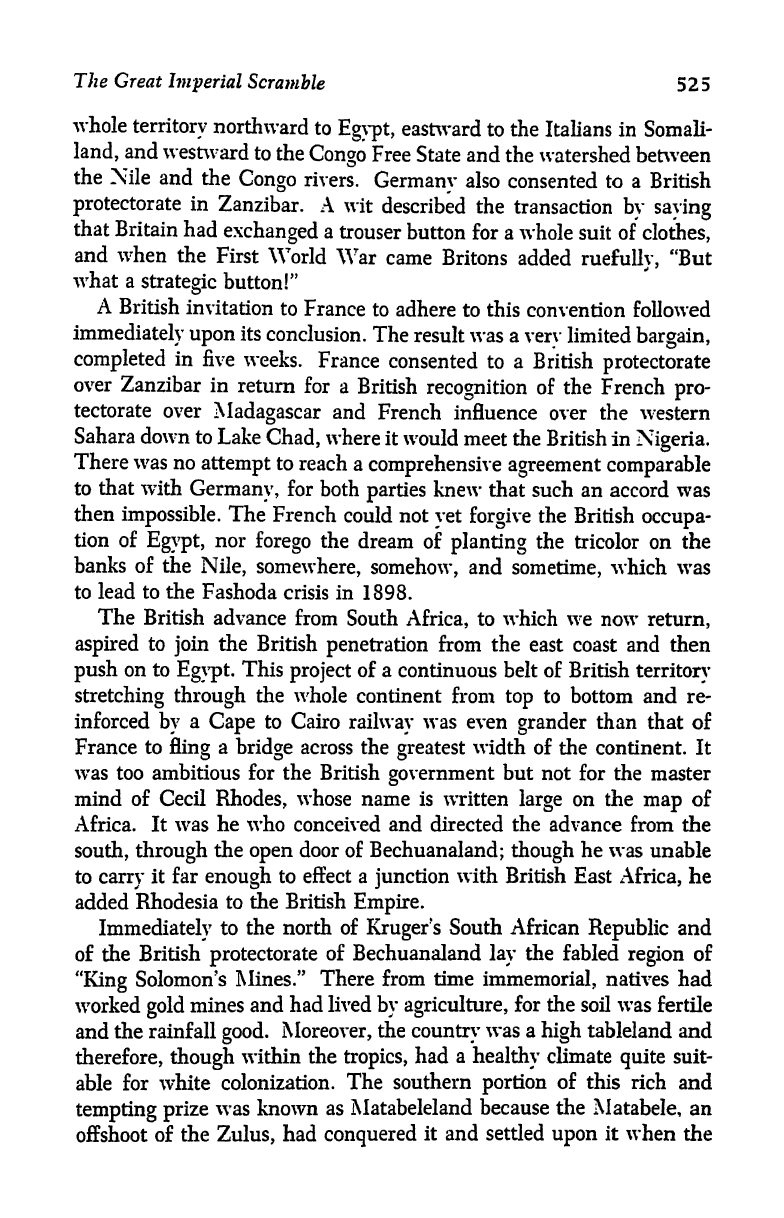
The Great
Imperial
Scramble
525
whole
territory
northward
to
Egypt,
eastward
to
the
Italians
in
Somali-
land,
and
westward
to
the
Congo
Free
State
and
the
watershed
between
the Nile
and
the
Congo
rivers.
Germany
also
consented
to
a
British
protectorate
in
Zanzibar.
A
wit
described the
transaction
by
saying
that
Britain
had
exchanged
a
trouser
button for a whole suit of
clothes,
and when
the
First
World
War
came
Britons
added
ruefully,
"But
what a
strategic
button!"
A
British
invitation
to
France
to
adhere
to this
convention followed
immediately
upon
its
conclusion.
The
result
was
a
very
limited
bargain,
completed
in
five
weeks.
France
consented to
a
British
protectorate
over
Zanzibar in
return for
a
British
recognition
of the French
pro-
tectorate
over
Madagascar
and
French
influence
over the western
Sahara down
to
Lake
Chad,
where it
would
meet
the British in
Nigeria.
There was
no
attempt
to
reach a
comprehensive
agreement
comparable
to
that
with
Germany,
for
both
parties
knew that such
an
accord was
then
impossible.
The
French
could
not
yet
forgive
the
British
occupa-
tion of
Egypt,
nor
forego
the
dream
of
planting
the
tricolor on
the
banks
of
the
Nile,
somewhere,
somehow,
and
sometime,
which was
to lead
to
the
Fashoda
crisis
in
1898.
The
British advance
from
South
Africa,
to which we
now
return,
aspired
to
join
the
British
penetration
from the
east coast and then
push
on to
Egypt.
This
project
of a
continuous belt of British
territory
stretching through
the
whole
continent from
top
to
bottom
and re-
inforced
by
a
Cape
to Cairo
railway
was even
grander
than
that
of
France
to
fling
a
bridge
across the
greatest
width
of
the continent. It
was too
ambitious
for the British
government
but
not for the
master
mind of
Cecil
Rhodes,
whose name
is written
large
on
the
map
of
Africa.
It was
he
who
conceived and directed
the
advance from the
south,
through
the
open
door of
Bechuanaland;
though
he was
unable
to
carry
it far
enough
to
effect a
junction
with British
East
Africa,
he
added
Rhodesia
to the
British
Empire.
Immediately
to
the north
of
Kruger's
South
African
Republic
and
of
the
British
protectorate
of Bechuanaland
lay
the
fabled
region
of
"King
Solomon's
Mines."
There
from
time
immemorial,
natives
had
worked
gold
mines and
had
lived
by
agriculture,
for the
soil
was fertile
and
the
rainfall
good.
Moreover,
the
country
was a
high
tableland and
therefore,
though
within
the
tropics,
had
a
healthy
climate
quite
suit-
able
for
white colonization.
The southern
portion
of
this
rich and
tempting
prize
was
known as Matabeleland
because the
Matabele,
an
offshoot
of
the
Zulus,
had
conquered
it
and settled
upon
it
when
the
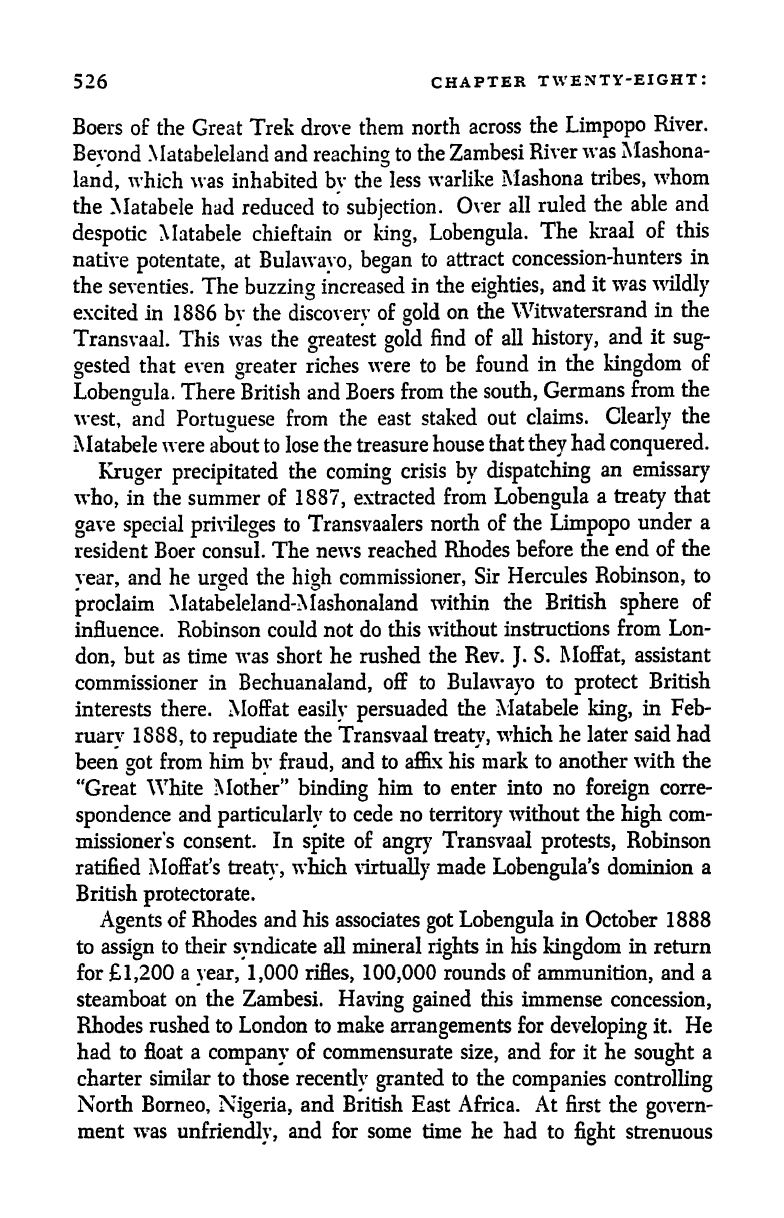
526
CHAPTER
TWENTY-EIGHT:
Boers
of
the
Great
Trek
drove
them north
across
the
Limpopo
River.
Beyond
Matabeleland and
reaching
to
the
Zambesi
River
was
Mashona-
land,
which
was
inhabited
by
the
less
warlike
Mashona
tribes,
whom
the
Matabele had reduced to
subjection.
Over
all
ruled
the
able and
despotic
Matabele chieftain or
king,
Lobengula.
The
kraal
of
this
native
potentate,
at
Bulawayo, began
to attract
concession-hunters
in
the
seventies.
The
buzzing
increased
in the
eighties,
and
it
was
wildly
excited in
1886
by
the
discovery
of
gold
on the
Witwatersrand
in the
Transvaal. This
was
the
greatest
gold
find
of
all
history,
and
it
sug-
gested
that
even
greater
riches
were to
be found
in the
kingdom
of
Lobengula.
There British and
Boers from
the
south,
Germans
from
the
west,
and
Portuguese
from
the
east
staked out
claims.
Clearly
the
Matabele were about to lose
the treasure
house
that
they
had
conquered.
Kruger precipitated
the
coming
crisis
by
dispatching
an
emissary
who,
in
the summer
of
1887,
extracted
from
Lobengula
a
treaty
that
gave
special
privileges
to
Transvaalers
north
of
the
Limpopo
under
a
resident Boer consul. The
news reached
Rhodes
before
die end of
the
year,
and he
urged
the
high
commissioner,
Sir
Hercules
Robinson,
to
proclaim
Matabeleland-Mashonaland
within
the
British
sphere
of
influence.
Robinson could not do
this without
instructions
from Lon-
don,
but as
time was
short
he rushed
the
Rev.
J.
S.
Moffat,
assistant
commissioner
in
Bechuanaland,
off to
Bulawayo
to
protect
British
interests
there. Moffat
easily
persuaded
the Matabele
king,
in Feb-
ruary
1888,
to
repudiate
the Transvaal
treaty,
which
he later said had
been
got
from
him
by
fraud,
and
to
affix his
mark to another
with the
"Great
White
Mother"
binding
him to enter into no
foreign
corre-
spondence
and
particularly
to cede no
territory
without
the
high
com-
missioner's
consent.
In
spite
of
angry
Transvaal
protests,
Robinson
ratified Moffat's
treat}*,
which
virtually
made
Lobengula's
dominion
a
British
protectorate.
Agents
of Rhodes and his associates
got
Lobengula
in
October
1888
to
assign
to
their
syndicate
all mineral
rights
in
his
kingdom
in return
for
1,200
a
year,
1,000 rifles, 100,000
rounds of
ammunition,
and
a
steamboat on
the Zambesi.
Having gained
this immense
concession,
Rhodes
rushed to London to
make
arrangements
for
developing
it.
He
had to
float a
company
of commensurate
size,
and
for it he
sought
a
charter
similar
to
those
recently
granted
to the
companies
controlling
North
Borneo,
Nigeria,
and British
East
Africa. At
first the
govern-
ment was
unfriendly,
and for some time
he
had to
fight
strenuous
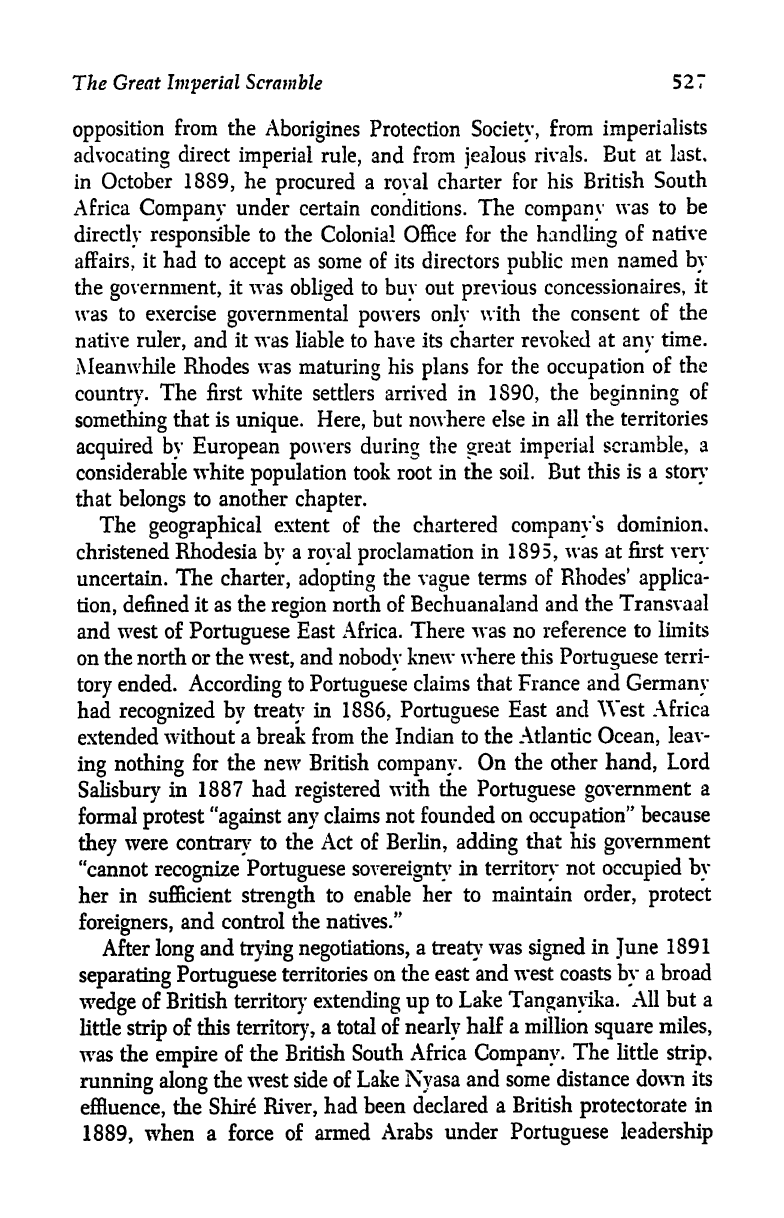
The
Great
Imperial
Scramble
527
opposition
from the
Aborigines
Protection
Society,
from
imperialists
advocating
direct
imperial
rule,
and
from
jealous
rivals.
But
at
last,
in October
1889,
he
procured
a
royal
charter for
his British
South
Africa
Company
under
certain conditions. The
company
was
to
be
directly
responsible
to the
Colonial Office
for
the
handling
of
native
affairs,
it
had
to
accept
as
some of its
directors
public
men
named
by
the
government,
it
was
obliged
to
buy
out
previous
concessionaires,
it
was to exercise
governmental powers
only
with
the consent
of
the
native
ruler,
and
it
was
liable to
have its charter
revoked
at
any
time.
Meanwhile
Rhodes was
maturing
his
plans
for
the
occupation
of
the
country.
The
first
white
settlers arrived
in
1890,
the
beginning
of
something
that is
unique.
Here,
but
nowhere else
in
all the
territories
acquired
by
European powers during
the
great
imperial
scramble,
a
considerable
white
population
took
root in
the soil.
But this is
a
story
that
belongs
to
another
chapter.
The
geographical
extent
of the
chartered
company's
dominion,
christened
Rhodesia
by
a
royal
proclamation
in
1895,
was at
first
very
uncertain.
The
charter,
adopting
the
vague
terms of
Rhodes'
applica-
tion,
defined
it as the
region
north of Bechuanaland
and
the Transvaal
and
west of
Portuguese
East
Africa. There
was
no
reference
to
limits
on
the north
or the
west,
and
nobody
knew where
this
Portuguese
terri-
tory
ended.
According
to
Portuguese
claims
that
France
and
Germany
had
recognized
by treaty
in 1886,
Portuguese
East
and
West
Africa
extended
without
a
break
from
the Indian to
the
Atlantic
Ocean,
leav-
ing
nothing
for
the
new
British
company.
On
the other
hand,
Lord
Salisbury
in
1887 had
registered
with
the
Portuguese
government
a
formal
protest "against
any
claims
not founded
on
occupation"
because
they
were
contrary
to the Act of
Berlin,
adding
that his
government
"cannot
recognize
Portuguese
sovereignty
in
territory
not
occupied
by
her
in sufficient
strength
to
enable
her
to
maintain
order,
protect
foreigners,
and control
the
natives."
After
long
and
trying
negotiations,
a
treaty
was
signed
in
June
1891
separating
Portuguese
territories
on the east
and west coasts
by
a
broad
wedge
of
British
territory
extending
up
to
Lake
Tanganyika.
All but
a
little
strip
of
this
territory,
a
total
of
nearly
half
a
million
square
miles,
was
the
empire
of the
British
South Africa
Company.
The little
strip,
running along
the
west side of
Lake
Nyasa
and
some
distance down
its
effluence,
the
Shire
River,
had
been declared
a
British
protectorate
in
1889,
when
a
force
of
armed
Arabs
under
Portuguese
leadership
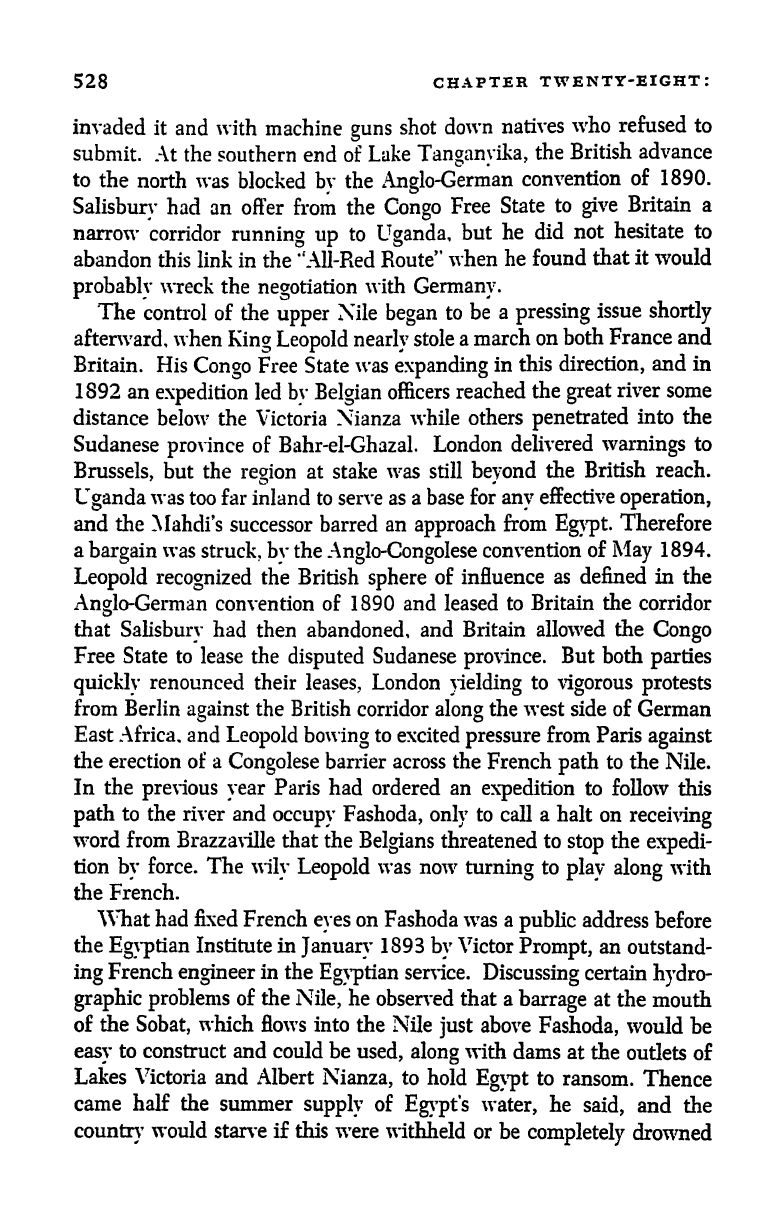
528
CHAPTER
TWENTY-EIGHT:
invaded
it
and with machine
guns
shot
down
natives
who refused to
submit.
At the
southern end of
Lake
Tanganyika,
the
British advance
to
the
north
was
blocked
by
the
Anglo-German
convention
of
1890.
Salisbury
had an offer
from
the
Congo
Free
State
to
give
Britain a
narrow
corridor
running
up
to
Uganda,
but
he
did
not
hesitate
to
abandon this
link in
the
"All-Red
Route"
when
he found
that
it
would
probably
wreck the
negotiation
with
Germany.
The
control of the
upper
Nile
began
to
be
a
pressing
issue
shortly
afterward,
when
King
Leopold
nearly
stole
a
march
on
both
France
and
Britain. His
Congo
Free
State
was
expanding
in
this
direction,
and in
1892
an
expedition
led
by
Belgian
officers
reached
the
great
river
some
distance
below the
Victoria
Nianza
while
others
penetrated
into the
Sudanese
province
of Bahr-el-Ghazal.
London
delivered
warnings
to
Brussels,
but
the
region
at stake
was still
beyond
the
British
reach.
Uganda
was too far
inland to serve
as a base
for
any
effective
operation,
and the
Mahdi's
successor barred
an
approach
from
Egypt.
Therefore
a
bargain
was
struck,
by
the
Anglo-Congolese
convention
of
May
1894.
Leopold
recognized
the British
sphere
of
influence
as defined in the
Anglo-German
convention
of 1890 and leased
to
Britain
the
corridor
that
Salisbury
had then
abandoned,
and Britain
allowed
the
Congo
Free State to
lease the
disputed
Sudanese
province.
But both
parties
quickly
renounced their
leases,
London
yielding
to
vigorous
protests
from
Berlin
against
the
British corridor
along
the
west side
of
German
East
Africa,
and
Leopold
bowing
to
excited
pressure
from Paris
against
the
erection of a
Congolese
barrier across the French
path
to
the
Nile.
In
the
previous
year
Paris
had
ordered
an
expedition
to follow
this
path
to the river and
occupy
Fashoda,
only
to call
a
halt on
receiving
word
from Brazzaville
that
the
Belgians
threatened to
stop
the
expedi-
tion
by
force. The
wily
Leopold
was now
turning
to
play
along
with
the
French.
What
had fixed French
eyes
on
Fashoda
w
r
as
a
public
address
before
the
Egyptian
Institute in
January
1893
by
Victor
Prompt,
an
outstand-
ing
French
engineer
in
the
Egyptian
service.
Discussing
certain
hydro-
graphic
problems
of the
Nile,
he
observed that a
barrage
at
the
mouth
of
the
Sobat,
which
flows
into
the
Nile
just
above
Fashoda,
would
be
easy
to
construct and could
be
used,
along
with
dams
at the
outlets of
Lakes Victoria and
Albert
Nianza,
to
hold
Egypt
to
ransom.
Thence
came half
the
summer
supply
of
Egypt's
water,
he
said,
and the
country
would starve if this were
withheld
or be
completely
drowned
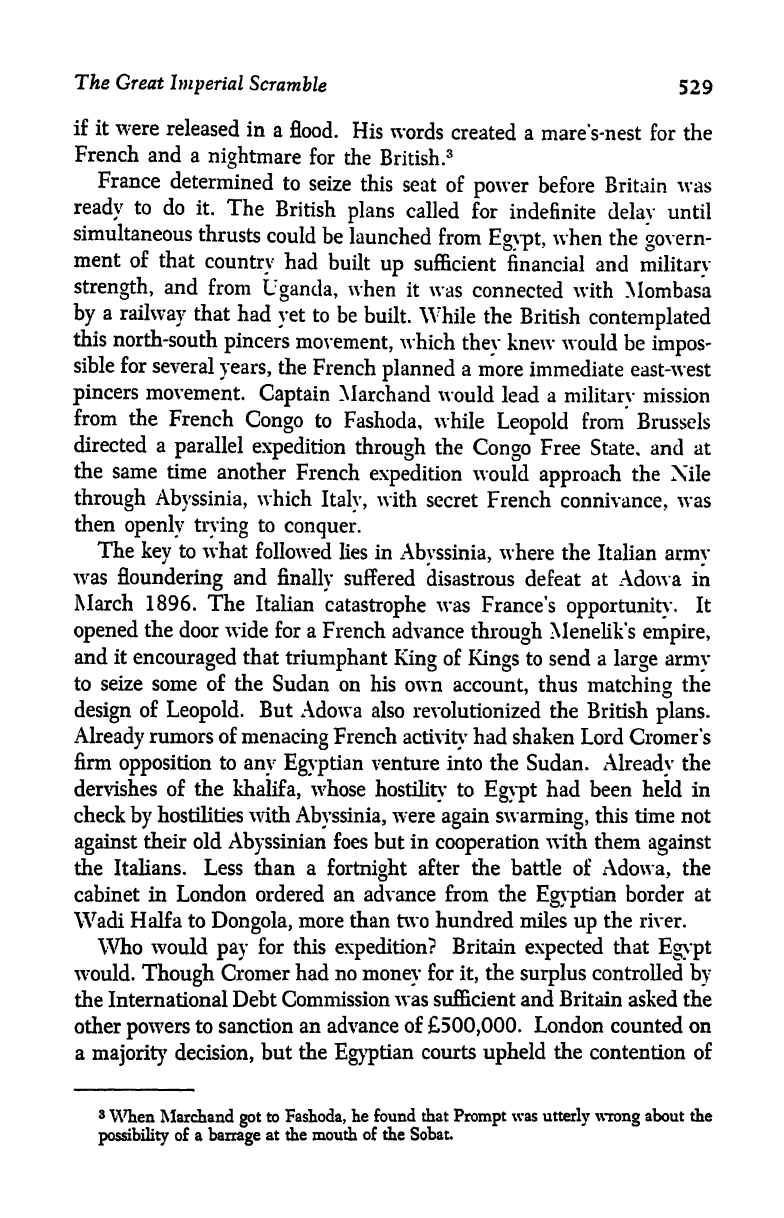
The Great
Imperial
Scramble
529
if it were
released in
a
flood.
His
words
created
a
mare's-nest
for
the
French
and
a
nightmare
for
the
British.
3
France
determined
to
seize
this
seat
of
power
before Britain
was
ready
to
do
it.
The
British
plans
called for
indefinite
delay
until
simultaneous
thrusts
could
be
launched
from
Egypt,
when the
govern-
ment
of
that
country
had
built
up
sufficient
financial
and
military
strength,
and
from
Uganda,
when
it
was
connected
with Mombasa
by
a
railway
that
had
yet
to
be
built.
While
the
British
contemplated
this
north-south
pincers
movement,
which
they
knew
would
be
impos-
sible for
several
years,
the
French
planned
a
more
immediate
east-west
pincers
movement.
Captain
Marchand
would
lead
a
military
mission
from
the
French
Congo
to
Fashoda,
while
Leopold
from
Brussels
directed
a
parallel
expedition
through
the
Congo
Free
State,
and
at
the
same
time
another
French
expedition
would
approach
the Xile
through Abyssinia,
which
Italy,
with
secret
French
connivance,
was
then
openly
trying
to
conquer.
The
key
to what
followed
lies
in
Abyssinia,
where the
Italian
army
was
floundering
and
finally
suffered
disastrous
defeat
at
Adowa
in
March
1896.
The
Italian
catastrophe
was
France's
opportunity.
It
opened
the
door
wide
for
a
French
advance
through
Menelik's
empire,
and
it
encouraged
that
triumphant
King
of
Kings
to
send
a
large
army
to seize some of the
Sudan on his
own
account,
thus
matching
the
design
of
Leopold.
But
Adowa also
revolutionized the
British
plans.
Already
rumors
of
menacing
French
activity
had shaken
Lord Cromer's
firm
opposition
to
any
Egyptian
venture into the
Sudan.
Already
the
dervishes of
the
khalifa,
whose
hostility
to
Egypt
had
been
held
in
check
by
hostilities with
Abyssinia,
were
again
swarming,
this time
not
against
their
old
Abyssinian
foes
but
in
cooperation
with
them
against
the Italians. Less than
a
fortnight
after the battle
of
Adowa,
the
cabinet
in
London ordered an
advance from
the
Egyptian
border
at
Wadi
Haifa
to
Dongola,
more than two
hundred
miles
up
the
river.
Who would
pay
for
this
expedition?
Britain
expected
that
Egypt
would.
Though
Cromer
had
no
money
for
it,
the
surplus
controlled
by
the
International Debt Commission
was sufficient and Britain
asked the
other
powers
to
sanction
an advance of
500,000.
London counted on
a
majority
decision,
but
the
Egyptian
courts
upheld
the
contention
of
3
When Marchand
got
to
Fashoda,
he found
that
Prompt
was
utterly
wrong
about the
possibility
of a
barrage
at
the mouth of
the
Sobat,
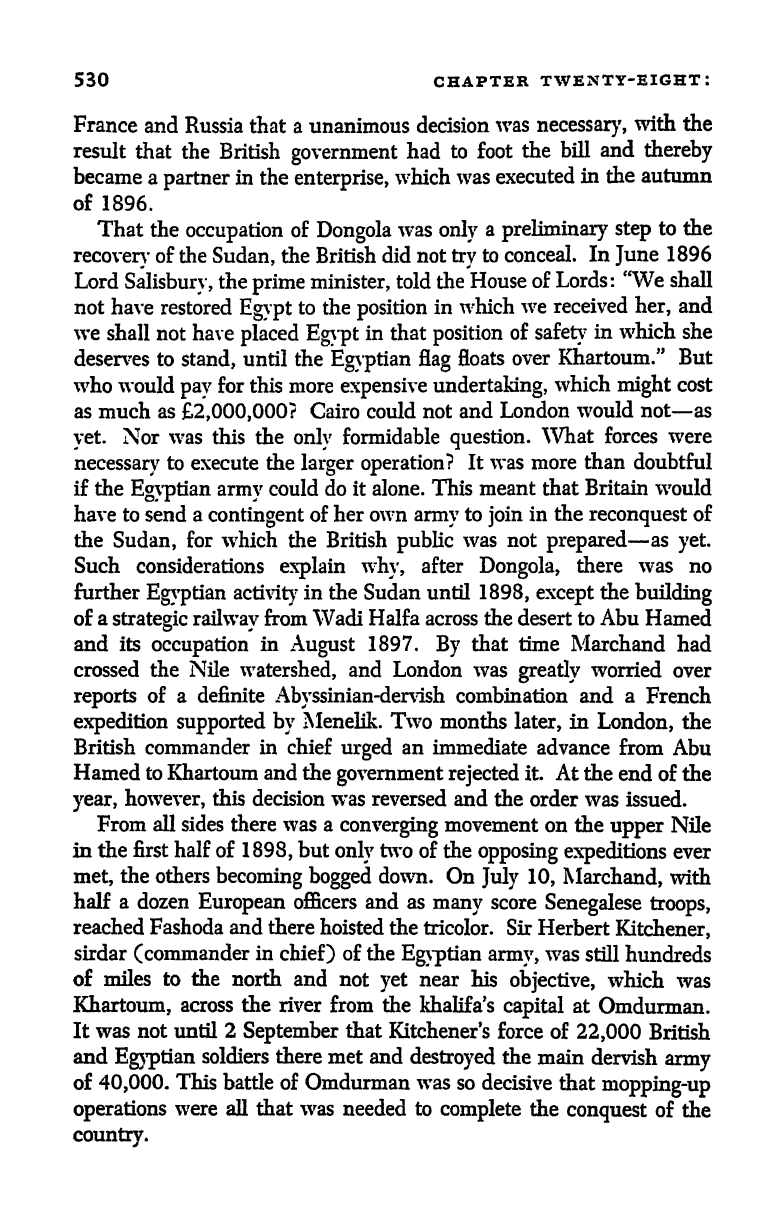
530
CHAPTER
TWENTY-EIGHT:
France
and
Russia that
a unanimous
decision
was
necessary,
with the
result
that the
British
government
had
to
foot
the
bill
and
thereby
became
a
partner
in the
enterprise,
which
was executed
in
the
autumn
of
1896.
That the
occupation
of
Dongola
was
only
a
preliminary
step
to the
recover}-
of
the
Sudan,
the
British
did
not
try
to conceal.
In
June
1896
Lord
Salisbury,
the
prime
minister,
told the
House
of
Lords:
"We shall
not
have
restored
Egypt
to the
position
in
which
we received
her,
and
we
shall not have
placed Egypt
in
that
position
of
safety
in which
she
deserves
to
stand,
until the
Egyptian
flag
floats
over
Khartoum."
But
who would
pay
for
this
more
expensive
undertaking,
which
might
cost
as
much
as
2,000,000?
Cairo
could
not and
London
would not as
yet.
Nor
was this
the
only
formidable
question.
What forces were
necessary
to
execute
the
larger
operation?
It
was more
than
doubtful
if
the
Egyptian
army
could do it alone.
This
meant
that
Britain would
have
to send
a
contingent
of her
own
army
to
join
in the
reconquest
of
the
Sudan,
for
which
the British
public
was not
prepared
as
yet.
Such
considerations
explain
why,
after
Dongola,
there was
no
further
Egyptian
activity
in
the
Sudan
until
1898,
except
the
building
of
a
strategic
railway
from Wadi
Haifa across the desert
to
Abu
Hamed
and its
occupation
in
August
1897.
By
that
time
Marchand had
crossed
the
Nile
watershed,
and London
was
greatly
worried over
reports
of a
definite
Abyssinian-dervish
combination and
a
French
expedition supported by
Menelik.
Two
months
later,
in
London,
the
British commander in chief
urged
an
immediate
advance
from
Abu
Hamed to Khartoum and the
government rejected
it. At
the
end
of the
year,
however,
this
decision was
reversed and
the order
was
issued.
From
all
sides
there
was
a
converging
movement on the
upper
Nile
in
the
first half of
1898,
but
only
two of
the
opposing expeditions
ever
met,
the others
becoming bogged
down. On
July
10,
Marchand,
with
half
a
dozen
European
officers
and
as
many
score
Senegalese
troops,
reached Fashoda and
there
hoisted the
tricolor. Sir
Herbert
Kitchener,
sirdar
(commander
in
chief)
of
the
Egyptian
army,
was
still
hundreds
of miles to
the
north and
not
yet
near
his
objective,
which
was
Khartoum,
across
the river
from
the
khalifa's
capital
at
Omdunnan.
It was
not
until
2
September
that
Kitchener's
force
of
22,000
British
and
Egyptian
soldiers there met and
destroyed
the
main
dervish
army
of
40,000.
This battle
of
Omdurman
was
so
decisive
that
mopping-up
operations
were
all
that
was
needed to
complete
the
conquest
of the
country.
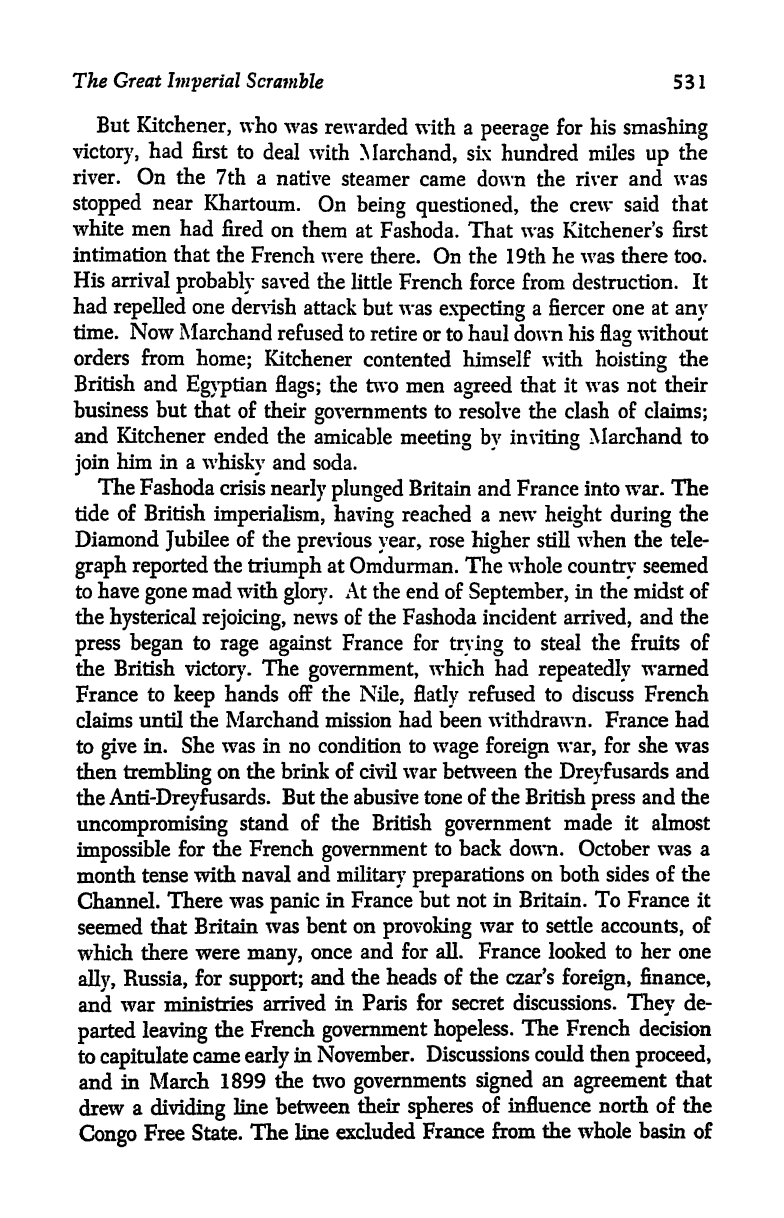
The
Great
Imperial
Scramble
5
3
1
But
Kitchener,
who
was
rewarded with a
peerage
for
his
smashing
victory,
had
first
to
deal
with
Marchand,
six hundred
miles
up
the
river. On the
7th a
native
steamer
came
down
the
river
and
was
stopped
near
Khartoum.
On
being questioned,
the
crew
said
that
white
men
had
fired
on
them at
Fashoda.
That
was
Kitcheners
first
intimation that
the
French
were
there. On the 19th
he was there too.
His
arrival
probably
saved
the
little French
force from destruction.
It
had
repelled
one
dervish
attack
but was
expecting
a fiercer one
at
any
time. Now
Marchand
refused to
retire
or to haul down his
flag
without
orders
from
home;
Kitchener
contented himself
with
hoisting
the
British
and
Egyptian
flags;
the two men
agreed
that
it
was
not their
business
but
that
of their
governments
to
resolve
the
clash
of
claims;
and Kitchener
ended
the
amicable
meeting
by inviting
Marchand to
join
him in a
whisky
and soda.
The
Fashoda
crisis
nearly
plunged
Britain and
France into
war. The
tide
of
British
imperialism,
having
reached a new
height during
the
Diamond
Jubilee
of
the
previous
year,
rose
higher
still
when the tele-
graph
reported
the
triumph
at
Omdurman. The whole
country
seemed
to
have
gone
mad with
glory.
At
the end of
September,
in
the
midst
of
the
hysterical
rejoicing,
news of the
Fashoda
incident
arrived,
and the
press
began
to
rage
against
France
for
trying
to
steal the fruits of
the
British
victor}
7
.
The
government,
which
had
repeatedly
warned
France
to
keep
hands off
the
Nile,
flatly
refused
to
discuss French
claims until
the Marchand
mission
had
been
withdrawn. France had
to
give
in. She
was in
no condition
to
wage
foreign
war,
for
she was
then
trembling
on
the brink
of
civil war between
the
Dreyfusards
and
the
Anti-Dreyfusards.
But the abusive
tone
of the
British
press
and the
uncompromising
stand of
the British
government
made it
almost
impossible
for the
French
government
to back down,
October was
a
month
tense
with naval and
military
preparations
on
both
sides of
the
Channel.
There
was
panic
in
France
but
not in Britain. To France it
seemed
that
Britain
was bent on
provoking
war
to settle
accounts,
of
which
there
were
many,
once
and for all. France
looked to her
one
ally,
Russia,
for
support;
and
the
heads
of
the czar's
foreign,
finance,
and
war ministries
arrived
in
Paris for
secret discussions.
They
de-
parted
leaving
the
French
government
hopeless.
The French
decision
to
capitulate
came
early
in
November.
Discussions
could then
proceed,
and
in
March
1899
the two
governments
signed
an
agreement
that
drew
a
dividing
line
between
their
spheres
of influence north
of the
Congo
Free
State.
The
line
excluded
France from
the
whole
basin of
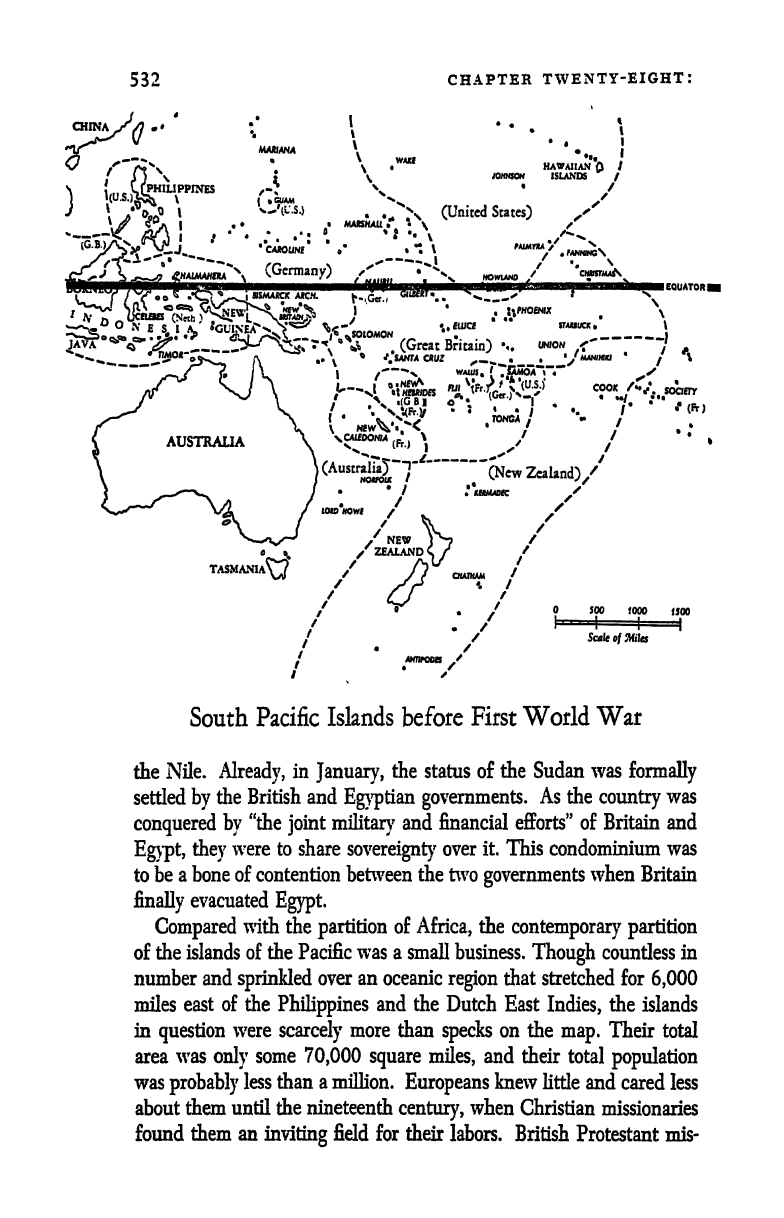
532
CHAPTER
TWENTY-EIGHT:
South
Pacific
Islands
before
First
World
War
the
Nile.
Already,
in
January,
the status of the Sudan
was
formally
settled
by
the British and
Egyptian
governments.
As
the
country
was
conquered
by
"the
joint military
and financial efforts"
of Britain and
Egypt,
they
were to share
sovereignty
over
it. This condominium
was
to be
a
bone
of contention
between
the two
governments
when
Britain
finally
evacuated
Egypt.
Compared
with
the
partition
of
Africa,
the
contemporary partition
of the islands of the
Pacific was a small business.
Though
countless
in
number and
sprinkled
over
an
oceanic
region
that
stretched for
6,000
miles
east
of
the
Philippines
and the
Dutch East
Indies,
the
islands
in
question
were
scarcely
more than
specks
on the
map.
Their total
area
was
only
some
70,000
square
miles,
and their
total
population
was
probably
less
than a
million.
Europeans
knew
little and
cared less
about
them until the
nineteenth
century,
when
Christian
missionaries
found
them
an
inviting
field
for
their
labors. British
Protestant
mis-
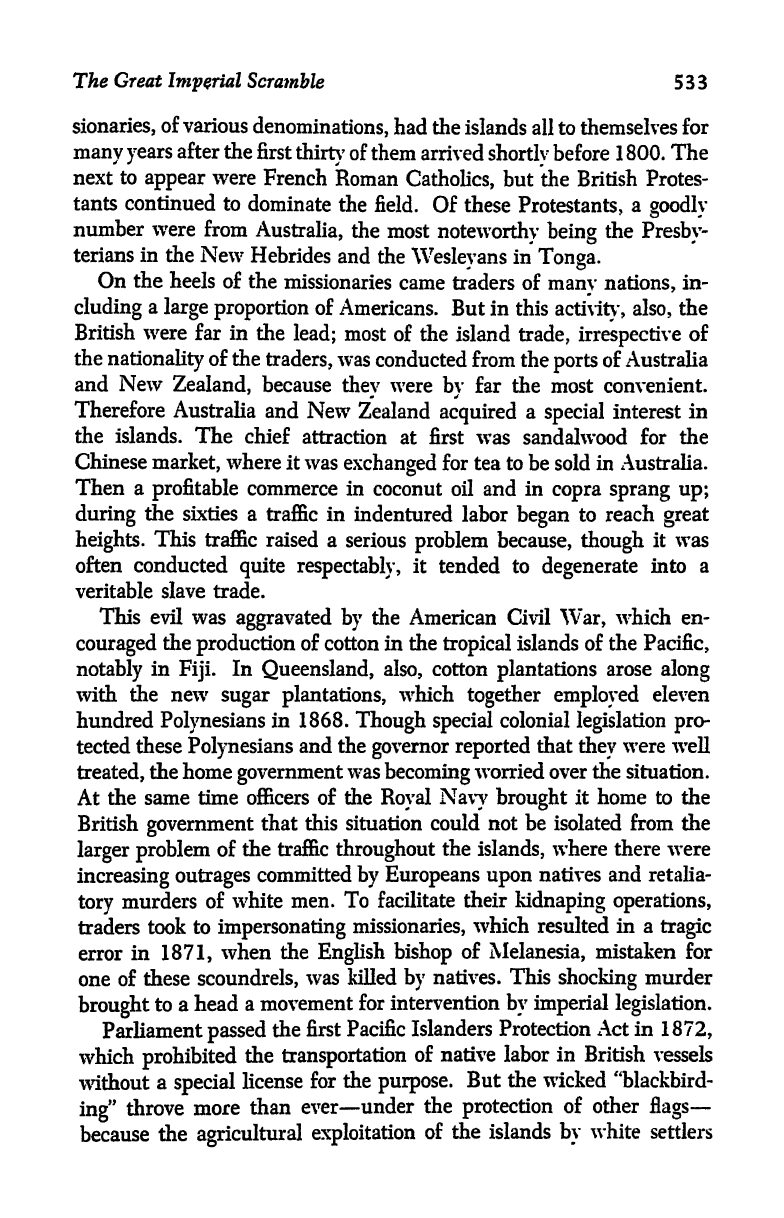
The
Great
Imperial
Scramble
533
sionaries,
of
various
denominations,
had the
islands
all
to themselves
for
many years
after
the
first
thirty
of
them arrived
shortly
before
1
800.
The
next
to
appear
were
French
Roman
Catholics,
but the
British Protes-
tants
continued
to
dominate
the
field. Of these
Protestants,
a
goodly
number
were
from
Australia,
the
most
noteworthy being
the
Presby-
terians
in
the
New
Hebrides
and the
Wesleyans
in
Tonga.
On
the
heels
of the
missionaries
came traders of
many
nations,
in-
cluding
a
large
proportion
of
Americans. But in this
activity,
also,
the
British
were
far in
the
lead;
most
of the island
trade,
irrespective
of
the
nationality
of the
traders,
was
conducted
from
the
ports
of Australia
and
New
Zealand,
because
they
were
by
far the
most
convenient.
Therefore
Australia
and New
Zealand
acquired
a
special
interest
in
the islands.
The
chief
attraction at
first was
sandalwood
for
the
Chinese
market,
where
it
was
exchanged
for tea
to
be
sold
in
Australia.
Then a
profitable
commerce in
coconut oil
and
in
copra sprang
up;
during
the sixties a
traffic
in
indentured labor
began
to
reach
great
heights.
This traffic
raised a
serious
problem
because,
though
it was
often
conducted
quite
respectably,
it
tended
to
degenerate
into
a
veritable slave trade.
This
evil was
aggravated by
the American Civil
War,
which
en-
couraged
the
production
of cotton in
the
tropical
islands
of
the
Pacific,
notably
in
Fiji.
In
Queensland,
also,
cotton
plantations
arose
along
with the new
sugar
plantations,
which
together
employed
eleven
hundred
Polynesians
in 1868.
Though
special
colonial
legislation pro-
tected
these
Polynesians
and the
governor
reported
that
they
were
well
treated,
the
home
government
was
becoming
worried over
the
situation.
At
the same
time officers
of the
Royal
Navy
brought
it home to
the
British
government
that
this situation could not
be isolated
from
the
larger
problem
of
the traffic
throughout
the
islands,
where
there
were
increasing
outrages
committed
by Europeans
upon
natives and retalia-
tory
murders
of
white
men.
To facilitate their
kidnaping operations,
traders took
to
impersonating
missionaries,
which
resulted
in a
tragic
error
in
1871,
when
the
English
bishop
of
Melanesia,
mistaken for
one
of
these
scoundrels,
was killed
by
natives. This
shocking
murder
brought
to
a
head
a
movement
for
intervention
by imperial
legislation.
Parliament
passed
the
first
Pacific
Islanders Protection Act in
1872,
which
prohibited
the
transportation
of
native
labor
in
British
vessels
without
a
special
license
for
the
purpose.
But
the wicked
"blackbird-
ing"
throve
more
than
ever
under
the
protection
of other
flags
because
the
agricultural
exploitation
of
the
islands
by
white settlers
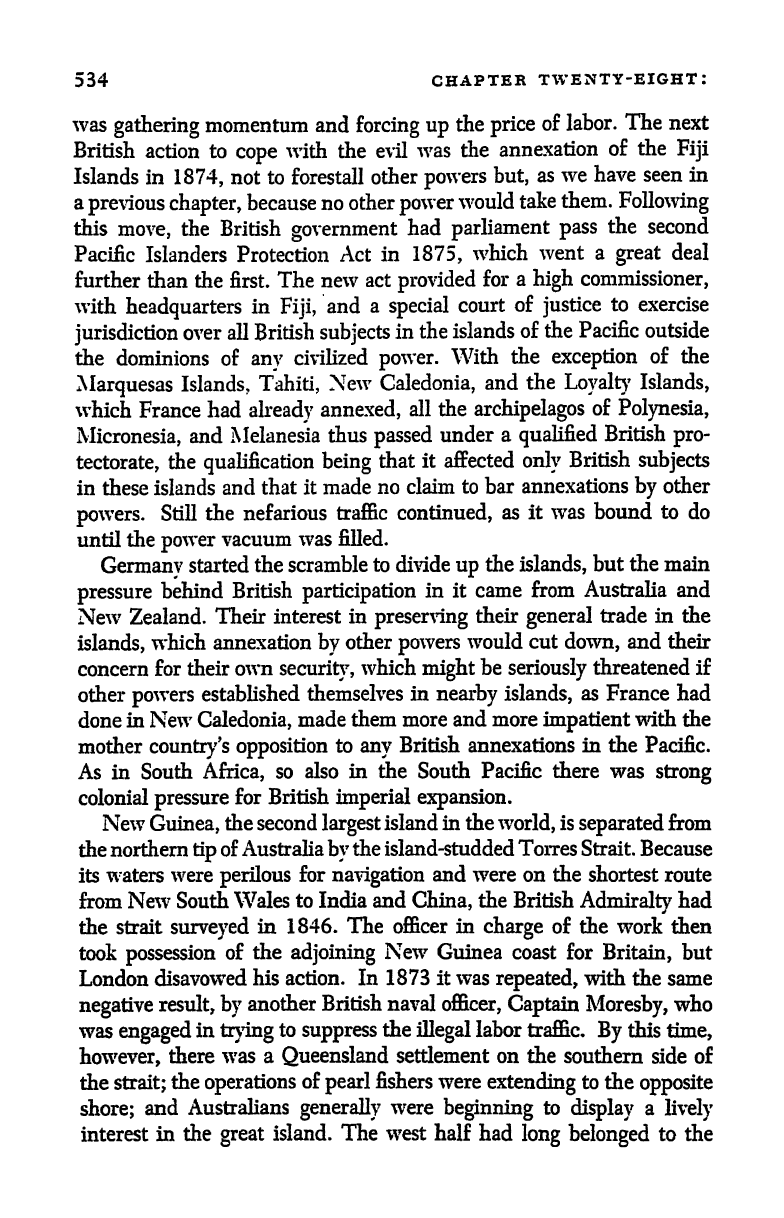
534
CHAPTER
TWENTY-EIGHT:
was
gathering
momentum and
forcing
up
the
price
of labor.
The next
British
action
to
cope
with the
evil
was
the
annexation
of
the
Fiji
Islands in
1874,
not
to
forestall
other
powers
but,
as
we
have seen in
a
previous
chapter,
because no
other
power
would take
them.
Following
this
move,
the British
government
had
parliament
pass
the second
Pacific
Islanders Protection
Act
in
1875,
which
went a
great
deal
further than the first.
The
new
act
provided
for
a
high
commissioner,
with
headquarters
in
Fiji,
and
a
special
court
of
justice
to
exercise
jurisdiction
over
all
British
subjects
in
the
islands
of the
Pacific
outside
the
dominions of
any
civilized
power.
With
the
exception
of the
Marquesas
Islands,
Tahiti,
New
Caledonia,
and
the
Loyalty
Islands,
which France
had
already
annexed,
all
the
archipelagos
of
Polynesia,
Micronesia,
and
Melanesia
thus
passed
under
a
qualified
British
pro-
tectorate,
the
qualification
being
that
it affected
only
British
subjects
in
these islands
and
that it
made
no claim
to bar
annexations
by
other
powers.
Still
the nefarious
traffic
continued,
as
it
was bound to do
until
the
power
vacuum
was
filled.
Germany
started
the scramble
to divide
up
the
islands,
but
the main
pressure
behind
British
participation
in
it came from
Australia and
New
Zealand.
Their
interest
in
preserving
their
general
trade
in the
islands,
which
annexation
by
other
powers
would
cut
down,
and
their
concern
for
their own
security,
which
might
be
seriously
threatened if
other
powers
established
themselves
in
nearby
islands,
as France
had
done
in
New
Caledonia,
made
them more and more
impatient
with
the
mother
country's
opposition
to
any
British
annexations
in the
Pacific.
As in South
Africa,
so also
in
die
South
Pacific there
was
strong
colonial
pressure
for
British
imperial expansion.
New
Guinea,
the second
largest
island
in the
world,
is
separated
from
the
northern
tip
of
Australia
by
the island-studded Torres Strait.
Because
its waters
were
perilous
for
navigation
and
were
on the shortest
route
from
New South
Wales
to
India
and
China,
the British
Admiralty
had
the
strait
surveyed
in
1846.
The
officer
in
charge
of tie
work then
took
possession
of
the
adjoining
New
Guinea coast
for
Britain,
but
London disavowed
his
action. In
1873
it was
repeated,
with
the same
negative
result,
by
another
British
naval
officer,
Captain
Moresby,
who
was
engaged
in
trying
to
suppress
the
illegal
labor traffic.
By
this
time,
however,
there
was a
Queensland
settlement on the
southern
side of
the
strait;
the
operations
of
pearl
fishers
were
extending
to the
opposite
shore;
and
Australians
generally
were
beginning
to
display
a
lively
interest
in the
great
island. The
west
half had
long
belonged
to
the
